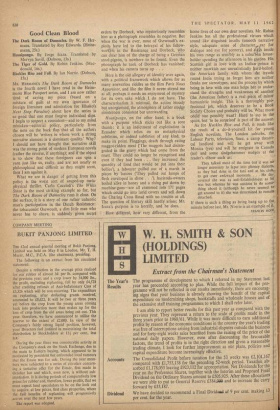Good Clean Blood
Huasipungo. By Jorge lcaza. Translated by Mervyn Savill. (Dobson, 15s.)
MK. HERMANs's The Dark Room of Damocles is the fourth novel I have read in the Heine- mann Blue Passport series, and 1 am now rather tired of saying my piece (based on a mixture of guilt at my own ignorance of foreign literature and' admiration for Hlasko's Next Stop Paradise) about how the series is so good that one must forgive individual slips. I begin to suspect a consistent--and to my mind mistaken—editorial policy, particularly from the note on the back flap that all the authors chosen will be `writers in whose work a strong narrative element is a dominant quality.' Why? I should not have thought that narrative skill was the strong point of modern European novels (rather the reverse, if anything); and if the object is to show that these foreigners can spin a yarn just like us, really, and are not nearly so philosophical and difficult as they might seem, then I am against it.
What we are in danger of getting from this policy is the worst sort of souped-up meta- physical thriller. Carlo Coceioli's The White Slone is the most striking example so far, but The Dark Room of Damocles runs it close. On the surface, it is a story of one rather unheroic man's participation in the Dutch Resistance: the tobacconist Osewoudt, a dim little man who never has to shave, is suddenly given secret orders by Dorbeck, who mysteriously resembles him as a photograph resembles its negative. But when the war is over, most of Osewoudt's ex- ploits have led to the betrayal of his fellow- wotl&ks in the Resistance and Dorbeck, who can clear him of the charge of being a Gerthan stool-pigeon, is nowhere to be found. Even the photograph he took of Dorbeck has vanished; and when his camera turns up . . .
Here is the old allegory of identity over again, with a political framework which allows for as many answerless riddles as the film Paris Nous Appartient, and like the film it never stirred me at all; perhaps it needs an enjoyment of mystery for its own sake which I do not have. The characterisation is minimal, the action bloody but unorganised, the atmosphere of rather stodgy sinisterness consistent but unrewarding.
Huasipungo, on the other hand, is a book with a purpose which sticks out like a sore thumb: it is an indictment of exploitation in Ecuador which relies on no metaphysical subtleties, or indeed subtleties of any kind, to make its point. Floggings, death through eating maggot-ridden meat (The maggots had disinte- grated in the gravy which had come from the roast. They could no longer be recognised and even if they had been . . . they increased the quantity of food that would be put into their bellies'), a labourer pulled out of a marsh in pieces by lassoes (They pulled out lumps of flesh enveloped in slime . . .'), hacienda-owners boiled alive in honey and a rising put down by machine-guns—are all crammed into 171 pages which could go into lurid covers and sell down the Charing Cross Road with no trouble at all. The question of literary skill hardly arises; Mr. Icaza's purpose is to horrify, and he does.
How different, how very different, from the home lives of our own dear novelists. Mr. Robia Jenkins has all the professional virtues which sound like disguised insults (smooth narrative style, adequate sense of character,,. ear for dialogue and eye for scenery), and stags inside his own range as sensibly as a suburban house- holder spending the afternoon in his garden. His Scottish girl in love with an Indian prince is neither mawkish nor unrealistically hard-boiled; the American family with whom she travels round India trying to forget him are neither freaks nor stereotypes; and the process by which being in love with one man helps her to under- stand the strengths and weaknesses of another (the American father) is a real piece of minor humanistic insight. This is a thoroughly pro- fessional job, which deserves to be a Book Society Choice and probably will be. What more could one possibly want? Hard to say in the space, but 'to be surprised' is part of the answer.
As for Hackles Rise and Fall, it reads like the result of a do-it-yourself kit for young English novelists. The London suburbs, the Labour Party, television, Suez, a camp theatri- cal landlord and will he get away with Monica (yes) and will he emigrate to Canada (no) and some sledgehammer nudges at the reader's elbow such as:
They talked most of the time but it was no longer necessary to lapse into phoney dialects, as they had done in the taxi and at his club, • to get over awkward moments. . . . He dis- covered she was as anti-Establishment as lie was but whereas he was anxious to do some- thing about it (although he never seemed to get around to it) she was determined to remain detached.
If there is such a thing as being bang up to the minute before last, Mr. Norrie is an example of it.
FRANCIS II01' !:


































 Previous page
Previous page